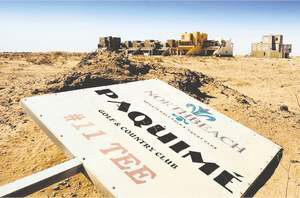 |
 |
 |
 Puerto Vallarta Real Estate | November 2007 Puerto Vallarta Real Estate | November 2007  
Property Investments in Mexico Can Be Risky
 Dennis Wagner - The Arizona Republic Dennis Wagner - The Arizona Republic
go to original


| A sign sits where an 11th tee should be near Puerto Penasco, Mexico. Known as Rocky Point among Arizonans, it is experiencing explosive growth, but with it come charges and counter charges of fraud. (Jack Kurtz/The Arizona Republic)

Guidelines for buying property in Mexico

• Don't try to do a deal on your own. Use licensed Mexican and U.S. real-estate agents, attorneys and accountants.

• Familiarize yourself with Mexican laws and regulations, which are not comparable to U.S. rules and protections.

• Understand the bank trust system and other mechanisms for non-Mexicans to acquire land.

• Be sure the seller holds clear title; obtain title insurance.

• Require all documents to be translated into English; read them carefully.

• Place deposits in a neutral, third-party escrow account.

Source: The Arizona Republic |
Puerto Penasco, Mexico — U.S. investors have poured more than $100 million into beachfront homes, motels and land in the Mexican vacation retreat known as Rocky Point, only to see their cash swallowed up by Mexican and U.S. developers who failed to build the projects.

The real-estate debacle is raising questions about the security of Americans' property investments even as Mexico continues to top the list of countries attractive to U.S. retirees.

Known as Playa Norte, or North Beach, the development in question has a projected value in the billions of dollars and covers 7,500 acres. It lies at the end of a dirt road about 12 miles from this Mexican tourist town, where desert dwellers enjoy the glimmering Gulf of California.

Scores of families and retirees have mortgaged homes or risked life savings for a piece of Margaritaville. A number of American developers also bought prime seaside land, planning to build and sell vacation homes to other Americans.

All believed literature published by government agencies, including the Arizona-Mexico Commission, stating that Mexico's fideicomiso, or bank trust, system safely ensures property rights to Americans.

The 14-year-old trust system has certainly worked for thousands of U.S. citizens who bought properties without problems. The buyers acquired the property under renewable, 50-year leases that are held in bank trusts.

But at North Beach, master developers in Mexico began raking in U.S. dollars in 1998, then hunkered down amid multiple lawsuits that have clouded title and blocked all construction. The buyers have not received ownership papers or refunds. The developers began work on some projects, but say the legal obstacles forced them to stop.

The losses have soured investors on acquiring stakes in Mexico and have shown that even U.S. buyers may face paralyzing disputes and potential fraud, along with their own mistakes.

Other than in court, no U.S. or Mexican government authority has taken responsibility or action to unravel the problems. | 
 | |
 |



